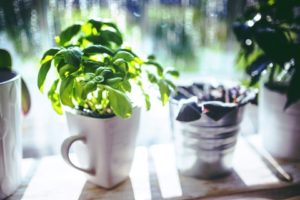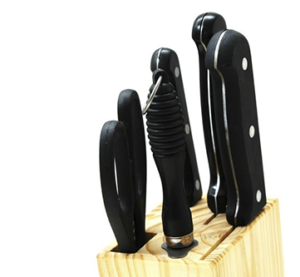
The Complete Guide to Growing your Herbs at Home
— July 26, 2018~
Thinking about starting your own herb garden? Great! Don’t know how? We’ve got you covered! Not only does an herb garden eliminate the need to constantly restock your spice rack, but fresh herbs make a significant difference in taste for any recipe! Following is everything you need to know about starting your own herb garden at home.
Basil
Loves Sun | Loves Moist Soil
Planting
If you choose to plant indoor, aim to plant 6 to 8 weeks before Spring. If you opt for planting outdoors, any time after Spring will suffice.
Special Care Instructions
Remove any flowers that appear to help preserve flavor.
Harvesting
Harvest the upper leaves first, only taking a few at a time.
Uses
Basil is great in salads, sandwiches, wraps, soups, sauces and on pizza.
Chives
Loves Sun | Loves Moist Soil
Planting
If your planning on planting indoor, try to get the seeds planted 8 to 10 weeks before the last frost of Spring. If you decide to plant outdoors, make sure to do so 3 to 4 weeks before instead.
Special Care
Ensure to remove any flowers the sprout as soon as they appear.
Harvesting
Using scissors, cut the outer leaves first while leaving approximately 2 inches of leaf to ensure continuous growth.
Uses
Chives, being a lot like onions, work perfect in almost everything, including salads, sandwiches, wraps and sauces.
Cilantro
Loves a Mix of Sun and Shade | Loves Moist Soil
Planting
It is highly recommended to only plant cilantro outdoors any time after the last frost to achieve the best results.
Special Care
Cilantro doesn’t do well during hot weather, so it is important to keep the soil cool at all times by offering shade and keeping it watered well.
Harvesting
When it comes to harvest, you have two options. Either cut the outer leaves once the plant reaches 6 inches tall or wait until it is fully grown and remove the entire plant.
Uses
Cilantro goes great in both salads and sandwiches but is best in dips and sauces.
Dill
Loves Sun | Loves Dry Soil
Planting
Just like Cilantro, Dill is a plant that does a lot better being planted outdoors. For the best results, make sure to plant the seeds 4 to 5 weeks before the last frost during Spring.
Special Care
Dill is extremely easy to care for, as it prefers a lot of sunlight and dryer soil. Keep in mind that just like every plant, it still needs a regular amount of water.
Harvesting
Always make sure that the plant is at least 12 inches tall before harvesting and never take more than a few leaves at a time.
Uses
Dill mixes great with fish, lamb, potatoes and peas.
Parsley
Loves Sun | Loves Moist Soil
Planting
When it comes to planting parsley indoors, 10 to 12 weeks before the last frost is preferred, as opposed to 3 to 4 weeks before when planting outdoors.
Special Care
When planting parsley, it is important to keep timing in mind as it takes a longer period for germination than other seeds.
Harvesting
To harvest, simply cut the outer stems slightly above ground level.
Uses
Parsley is perfect for salads and soups.
Rosemary
Loves Sun | Loves Dry Soil
Planting
Capable of being planted both indoors and outdoors, ensure you plant the seeds 8 to 10 weeks before the last frost if planting indoors or any time after if planning outdoors.
Special Care
Rosemary is a really difficult seed to germinate. If you are a beginner, it is wise to consider using a mature plant instead of starting from seeds.
Harvesting
While difficult to grow, all that is needed to be done to harvest this plant is to cut from the stem as needed.
Uses
Rosemary is amazing for both culinary and medical uses.
Thyme
Loves a Mix of Sun and Shade | Loves Dry Soil
Planting
Remember to plant the seeds indoors 6 to 10 weeks before the last frost of Spring or 2 to 3 weeks before if you’re planting outdoors.
Special Care
Thyme loves dry soil, so be careful not to overwater it. At the same time, it can be hard to germinate so beginners should consider starting with a mature plant.
Harvesting
Easy to harvest, simply cut from the stem as needed.
Uses
Thyme is great for meats, soups and stews.
All that’s left to do is to grab your personalized wood cutting board, favorite knife set and your newly grown herbs to begin making the most flavourful dishes than ever before. If you don’t already have a hardwood cutting board, check out these incredible models on Engraved Cutting Board’s online store, perfect for every type of gardener.







Leave a reply